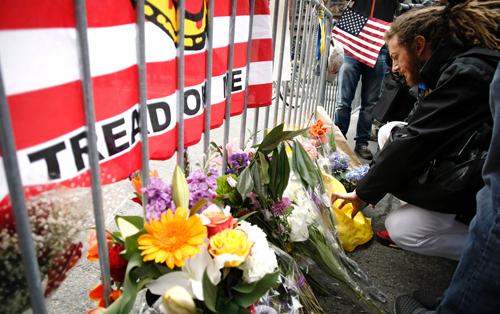
Flowers were placed at the site of the Boston Marathon to pay respect to those effected by the bombings on Tuesday April 16, 2013. Three people have died as a result of the bombings and over 170 have been reported as injured. (Courtesy of AP)
Why do bad things happen to good people? It’s a question that philosophers, theologians, and everyday people alike have grappled with for centuries.
In the past year, this nation has wept for the defenseless victims of the Aurora movie theater shooting, the innocent children of the Sandy Hook school massacre, and, most recently, the dead and injured in Boston following an unconscionable terrorist attack.
When faced with such unimaginable tragedy, it is a profoundly human instinct to ask, “Why?”
Christians and other people of faith have proven time and again to have their own responses to these terrible circumstances.
Few would argue that the victims of these attacks all died to fulfill some amorphous divine will; rather, the more palatable response that I’ve seen commonly offered is that God can be seen working not through the deranged mass murderer but the first responders and ordinary people trying to bring order to the inhuman chaos.
This is precisely why you see people offering their prayers up to Aurora, Newtown, Boston, or any other site of such a tragedy.
It’s why President Obama held an interfaith service on December 20th for the dead at Sandy Hook that included clergy members from a variety of mainstream faiths in America.
The answers that faith provides in the face of these acts of terror are sometimes the best comfort a person can ask for in spite of the circumstances.
Small wonder then that at times like these, atheists and agnostics often feel left out.
After all, what answer can a person without faith offer in a time like this? Are we supposed to say something along the lines of, “Well, nothing we do in this life matters anyway so why be sad about anything?”
Such an answer would no doubt satisfy Mersault from Albert Camus’s “L’Etranger,” but most of us well-adjusted human beings need genuine empathy and compassion.
We need an answer all our own too. We cannot take solace in the notion that these victims of murder are now smiling above us in heaven or that God is going to lead us to better times.
A person’s thoughts and concern in these times of strife are certainly meaningful gestures, but when we are told that we simply have to have faith that things are going to be okay because God is watching out for us, some of us find such a notion patronizing.
It’s not that we think that religious people are silly. Everyone is entitled to his or her way of coping with these terrible times, but I think it should be made clear that sometimes prayers just don’t cut it for us nontheists.
So does this make us cold, heartless monsters?
I should not think so.
I think atheists have an important voice to contribute when tragedies like these occur. We believe in the significance of this life we enjoy now because we know another one is probably not waiting for us. Our hearts bleed when we read the names of the dead, and we remember the lives these people enjoyed, the ones they touched in their own special way, and the legacies they will leave behind.
We see the tenacity of the human spirit, and understand that no matter how unfathomable a human being’s capacity for malice might be, a person’s compassion and good will can run just as deep.
We stand alongside these graves like anyone else, our faith in humanity shaken but never destroyed.
We must hold the hands of our neighbors, regardless of the faith they espouse, and recognize that our disdain for these perpetrators’ actions as well as the empathy poured out by so many people in response is something that will always unite us as members of the human race.
Bub is a junior majoring in English, political science and history.








